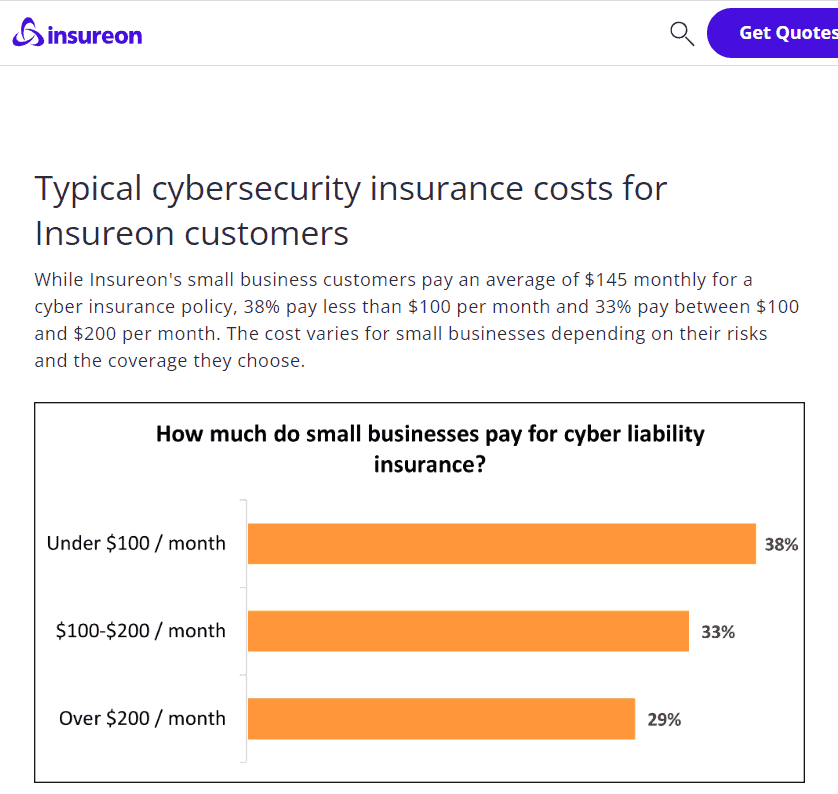
Get Business Insurance Starting At $21/Month
Obtain affordable coverage quickly and easily with The Hartford for business insurance. Just answer a few basic questions about your business to get started, and they'll do the rest.
Get Covered💳 Save money on credit card processing with one of our top 5 picks for 2026
Cybersecurity insurance protects your business from damages after data breaches and other online risks. Our cybersecurity guide will answer all your questions.
Cybersecurity insurance, also known as cyber risk, cyber liability, or data breach insurance, is a type of policy that protects businesses from financial harm following data breaches, hacker attacks, and other online risks.
How can you tell if this type of business insurance is something you need? Where is the best place to get cyber liability coverage, and how does it work?
Our complete guide to cybersecurity insurance will answer these questions and more!
Table of Contents
Cybersecurity coverage is a type of business insurance that can help your business pay for any losses or liability you incur following a cyberattack or data breach.
Cybersecurity insurance does not help you protect your data. However, it kicks in only after your cybersecurity measures have been tested and failed. Talk to your business insurance provider or a cybersecurity professional if you’re interested in a cyber risk assessment that can help you strengthen your internal protections.
Cybersecurity insurance kicks in when any unauthorized party gains access to your company’s confidential data, including customers’ payment information or employees’ personal identification. A malicious hacker might try to damage or destroy your computer network or system. Or you could fall victim to a ransomware attack, where your customer data is locked up, and criminals threaten to sell it if you don’t pay to regain access.
The cyber threat your business faces could be smaller and more personal: An employee mistakenly emails confidential information, an accountant responds to a phishing attempt, a contractor copies a hard drive, or a disgruntled worker steals a thumb drive, for example.
These types of actions, whether innocent mistakes or deliberate attacks, can be devastating. Your business could face overwhelming financial costs, lawsuits, and expensive mitigation efforts.
Cybersecurity insurance can help cover the costs of forensic investigations, legal costs, regulatory fines, crisis management services, business interruption costs, and even cyber extortion.
Not all cyber policies are the same. To make sure you have the best protection, talk with an insurance agent about your business and the specific types of risks you face.
While large data breaches and hacks affecting familiar names like Yahoo, Microsoft, Equifax, and Facebook grab all the headlines, the truth is that every business today is vulnerable to cybercrime. And small businesses may be more vulnerable than they think.
A cybercrime study conducted by Accenture shows that more than 40% of cyber attacks target small and medium-sized businesses. Yet only about one-quarter of small to medium-sized businesses carry cyber insurance.
Cyber insurance experts at The Hartford offer these guidelines to help you decide if your business needs cybersecurity insurance. If any of the following is true for your business, you should talk to an insurance agent about adding cybersecurity protection:
In plain terms, if you store personal information, including credit card numbers, addresses, Social Security numbers, and so on, your business can benefit from adding cyber coverage to your business insurance.
Every cyber insurance policy is different. You can work with your insurer to build the right type of coverage for your small business. Here are some common elements to look for, according to Hiscox Insurance:
Most cyber policies contain exclusions, meaning types of damages that will not be covered under the policy. Here are some common examples:
When you work with an insurance agent to build your cyber coverage, you’ll want to go into the conversation already familiar with these types of cybersecurity coverage:
The average cost of cybersecurity insurance is $145/month, according to Insureon. That adds up to $1,740/year. The following table breaks down the costs further, showing that 38% of Insureon’s small business customers pay less than $100/month for cybersecurity insurance.

Screenshot of Insureon webpage, captured 7/5/2023
That may seem like a lot to fit into your small business budget. But before you dismiss the cost of insurance, consider the cost of not having coverage. According to an IBM report on the cost of data breaches, the average US data breach costs a company $9.44 million. Suddenly, that $145/month seems like a bargain, doesn’t it?
Buying insurance is one of the costs of doing business. Although you may think the price puts cybersecurity coverage out of your reach, the unfortunate reality is that skipping business insurance can be more costly than paying for the coverage you need.
If you’re still wondering if you need business insurance in general, our guide to business insurance can help you understand how business insurance works, who needs it, and what types of coverage matter most.
Cybersecurity insurance can be critical coverage for any business that routinely handles sensitive data, such as your customer’s payment information for online orders. Talk to your insurance provider about what kind of cyber coverage your business needs.
Still looking for business insurance? Check out our list of the best small business insurance providers. Companies like The Hartford, Travelers, and Hiscox can help you add cyber coverage to your business owner’s policy or purchase a separate cybersecurity policy.
Note: If your business is very small, you may be able to buy an affordable policy through a smaller provider like Thimble or Next. Although you may be focused on how much coverage will cost and how you can pay for it, your first step should be contacting a provider or two and asking for a fast, free quote for the coverage your business needs.
Want to help shape the future of the Merchant Maverick website? Join our testing and survey community!
By providing feedback on how we can improve, you can earn gift cards and get early access to new features.
 Experience competitive rates, excellent customer support, and a fast & easy claim process. Request a free analysis today.
Get Started
Experience competitive rates, excellent customer support, and a fast & easy claim process. Request a free analysis today.
Get Started
Help us to improve by providing some feedback on your experience today.
The vendors that appear on this list were chosen by subject matter experts on the basis of product quality, wide usage and availability, and positive reputation.
Merchant Maverick’s ratings are editorial in nature, and are not aggregated from user reviews. Each staff reviewer at Merchant Maverick is a subject matter expert with experience researching, testing, and evaluating small business software and services. The rating of this company or service is based on the author’s expert opinion and analysis of the product, and assessed and seconded by another subject matter expert on staff before publication. Merchant Maverick’s ratings are not influenced by affiliate partnerships.
Our unbiased reviews and content are supported in part by affiliate partnerships, and we adhere to strict guidelines to preserve editorial integrity. The editorial content on this page is not provided by any of the companies mentioned and has not been reviewed, approved or otherwise endorsed by any of these entities. Opinions expressed here are author’s alone.
 Experience competitive rates, excellent customer support, and a fast & easy claim process. Request a free analysis today.
Get Started
Experience competitive rates, excellent customer support, and a fast & easy claim process. Request a free analysis today.
Get Started